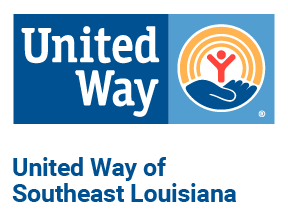
KEY FINDINGS | HOW UNITED WAY HELPS
CHILDREN IN FINANCIAL HARDSHIP IN LOUISIANA
Findings from the ALICE in Focus: Children Research Brief
→ Download the full ALICE in Focus: Children Louisiana Research Brief
→ View interactive dashboards and local maps
The number of children growing up in financial hardship in Louisiana has been systematically undercounted. For decades, policymakers and community stakeholders have relied on the outdated Federal Poverty Level (FPL) to understand the extent of financial hardship in their communities. According to the FPL, 26% of children in Louisiana (279,481) lived in poverty in 2019. Yet United For ALICE data shows that another 31% (339,155) were also growing up in hardship, in households that earned above the FPL but not enough to afford the basics in the communities where they lived.
The reality is that 618,636 children in Louisiana — 57% of all children — lived in a household with income below the ALICE Threshold of Financial Survival in 2019, the highest rate in the nation. These households included families in poverty as well as those who were ALICE: Asset Limited, Income Constrained, Employed. ALICE households don’t earn enough to afford the essentials of housing, child care, food, transportation, health care, a smartphone plan, and taxes — the basics needed to live and work in the modern economy.
KEY FINDINGS FOR SOUTHEAST LOUISIANA
More than half (57%) of children in Louisiana lived in households experiencing financial hardship in 2019, the highest rate of all U.S. states. In Southeast Louisiana (Jefferson, Orleans, Plaquemines, St. Bernard, St. Tammany, Tangipahoa, and Washington parishes),
-
55% of children lived below the ALICE Threshold.
-
This includes 24% below the Federal Poverty Line,
-
and an additional 32% ALICE.
While there are children below the ALICE Threshold across all demographic groups,
-
66% of Black children and 56% of Hispanic children in Southeast Louisiana lived in households with income below the ALICE Threshold in 2019,
-
compared to 36% of white children.
Having working parents or guardians does not guarantee financial stability:
-
26% of Southeast Louisiana children in households with two adults in the labor force were still below the ALICE Threshold in 2019.
Children below the ALICE Threshold often lack access to resources ranging from stable housing and public assistance to education and broadband services.
-
More than 95,324 children below the ALICE Threshold in Southeast Louisiana did not participate in SNAP,
-
and nearly 56,163 had no high-speed internet access at home in 2019.
|
CHILDREN IN SOUTHEAST LOUISIANA
|
WHAT IS UNITED WAY DOING TO HELP?
United Way of Southeast Louisiana believes that a child’s access to opportunity should not be determined by their family’s income level.
We support better health, education, and financial stability for children and families under the ALICE Threshold through initiatives including:
Early Care & Education Advocacy
Ninety-percent of brain development occurs before a child enters kindergarten, making early learning experiences foundational to their future success. But the cost of quality early childhood education is out of reach for many ALICE households. United Way SELA has successfully advocated for millions of dollars in local and state funding to help more low-income families afford quality child care for their children.
New Orleans Campaign for Grade-Level Reading
This collaborative is working to increase the number of New Orleans students who are reading on grade-level by the end of third grade by improving school readiness, reducing chronic absence, and promoting summer learning.
United for Early Care and Education
United Way SELA and partners launched United for Early Care & Education in the early days of the COVID-19 pandemic to help child care centers keep their doors open. The program’s free technical and legal assistance helped 81 facilities receive federal grants and loans. This funding allowed centers to avoid permanent closure and continue providing quality, affordable care to children and families.
Community Partner Funding
United Way SELA funds over 20 proven programs providing educational services and supports to children and youth across our seven-parish region. From the YMCA of Bogalusa’s afterschool programs to College Track New Orleans’ efforts to help low-income, first-generation scholars earn college degrees, these agencies are creating a better, stronger community through the power of education.
Workforce Training for Low-Income Households
Our workforce development partnerships help local nonprofits receive federal reimbursements for employment and training services provided to certain individuals. This funding allows more households to gain skills, training, work, or experience that will increase their self-sufficiency.







